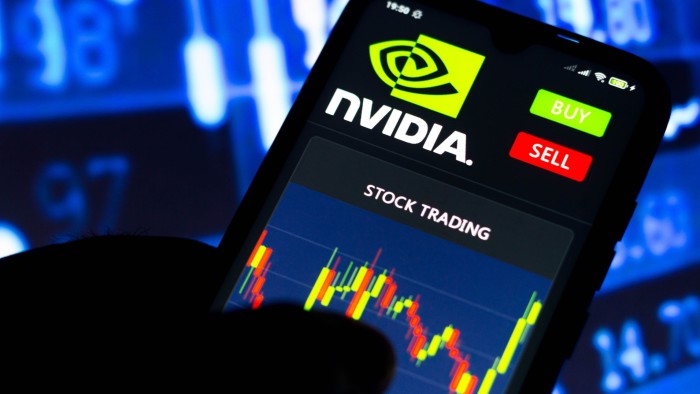Unlock the Editor’s Digest for free
Roula Khalaf, Editor of the FT, selects her favourite stories in this weekly newsletter.
The artificial intelligence revolution over the past two years has been a gift to investors. It gripped a clutch of winner-takes-all stocks and catapulted them higher, creating multitrillion-dollar companies and padding out portfolios.
With so much at stake, it is natural to wonder whether this will all end in tears. The echoes of the dotcom bust at the turn of this century are strong, and having so much riding on such a small clique of companies — Nvidia, Microsoft and the like — is a concern. A technological, geopolitical or regulatory slip-up could have devastating effects.
Last week, the European Central Bank added its voice to those urging caution, noting in its regular financial stability review that the “concentration among a few large firms raises concerns over the possibility of an AI-related asset price bubble”. That “b-word” is not one you generally want to see in such dry publications.
Given the dominance of this theme in US markets, and the dominance of the US over global markets, a disappointment in earnings expectations for these companies poses “the risk of adverse global spillovers” if this all goes wrong, the ECB added. After all, the so-called Magnificent Seven stocks in the US, comprising chip designers and hyperscalers, account for around a third of the value of the entire S&P 500 index. They have doubled in value over the past two years, while the index has gained around 50 per cent.
Investors know this, of course. Overcrowding in tech stocks has topped fund managers’ list of market concerns for nearly two years. But the tendency among investors is still to assume that balance and harmony will at some point re-emerge. Either the big stocks will stop rallying so hard or the (still alleged) benefits of AI will trickle through the corporate world, pulling up the market as a whole. Similarly, the gap between the US, the undisputed champion of the tech race, and the rest of the world, will shrink. Mean reversion will occur, just as it always has done in the past.
At the start of this year, many investors were looking for exactly that — a fading in US exceptionalism and tech stock concentration. Both have in fact intensified. It feels like a good time, then, to question whether they are features, not bugs, of this new technological era.
It is hard to say this with a straight face when, very often, our lived everyday experience of this technology remains, honestly, rubbish. No, I do not want an AI widget to rewrite my emails, or my LinkedIn posts, with material scraped from other emails and LinkedIn posts. Thanks, Mr Customer Service Robot, but I would like to speak to a human, please. It is still a leap of faith to imagine the potential productivity benefits are as vast as the tech bros tell us.
Believing that the delightful ride higher in US stocks can keep on running does demand some pretty heroic assumptions about the continued pace of corporate earnings growth. Nonetheless, some market watchers are starting to wonder whether something fundamental has shifted here. One reason is that companies like Nvidia are walking the walk. The earnings match the hype, which means price-to-earnings ratios are still reasonably tame, in contrast to the dotcom boom and bust. “Investors expect less from the mega-caps now than they did in 2000,” said investment house GMO in a note earlier this year. “In a real sense, the stakes are lower today.”
Second, at the risk of sounding like a heavy consumer of the kool aid, it is possible that we have entered a new paradigm here — a possibility put forward by Jean Boivin, a former central banker and now global head of research for the BlackRock Investment Institute. AI has, he says, the potential “to drive innovation in innovation itself”.
Typically, Boivin would see the large and growing gap between, say, US and German stocks as a reason to snap up some European bargains. Now, though, “if this is not a cyclical story but structural, like AI, it’s not clear that there is a form of mean reversion that should be happening.” Similarly, market concentration does not suggest market fragility but success in an industry with high barriers to entry.
Assuming that market concentration will dissipate, or that big tech stocks will buckle, is like “trying to apply a framework that does not necessarily apply,” Bovin says. “You are either in or out.”
This may all sound like a stretch, and if you want to be out, fine. But if investors are still talking about weird extremes in AI stocks this time next year, we may have to agree they are not weird or extreme after all.
https://www.ft.com/content/6e893618-d75e-4e67-9876-249540a27d13


